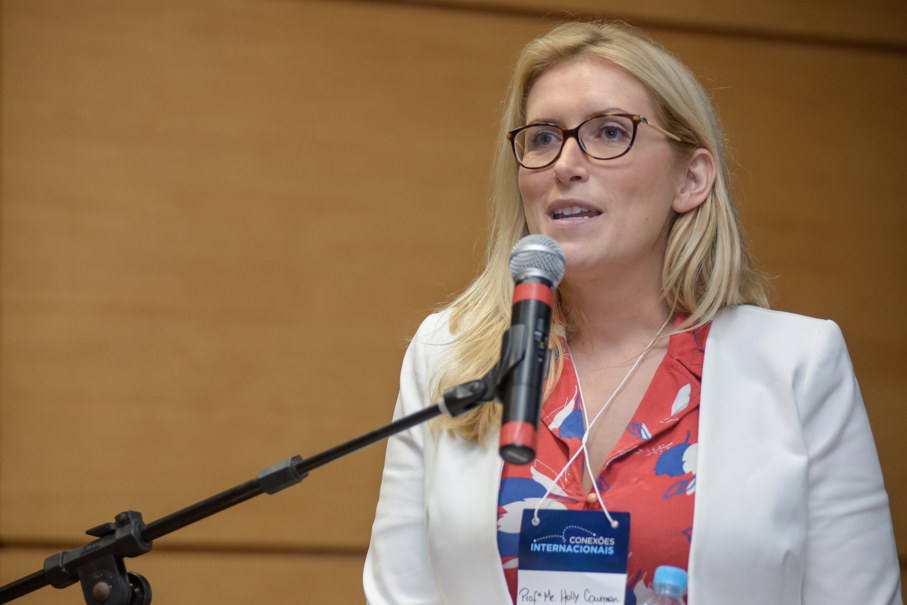Event featured conferences, informal sessions, exchange of experiences and representative of Mary Immaculate College
The first edition of Conexões Internacionais brought together researchers, professors and graduate students at PUCRS on Sep 26. Brought to the community by the Office for International Cooperation, with support of the Office of the Vice President for Research and Graduate Studies (Propesq), the event focused on international cooperation in research. Research of excellence, internationalization of higher education and a lecture by Ms Holly Cowman, Director of International Relations of Mary Immaculate College, Ireland, were the highlights of the program. At the end, the audience was invited to join a gastronomic fair.
At the opening, the Director of Graduate Programs of Propesq, Dr Christian Kristensen, and the Dean of International Cooperation, Dr Heloísa Delgado, were proud to make mention of the Programa Institucional de Internacionalização (Institutional Program of Internationalization) (Capes/PrInt), which will earn PUCRS a higher level of expertise in the internationalization of graduate programs. The Vice President of Undergraduate Studies and Continuing Education, Br. Manuir Mentges, addressed the awareness of the University as a center to attract talents and reinforced its mission to promote and disseminate knowledge.
Research of Excellence
The first lectured was delivered by the Superintendent of Innovation of PUCRS, Dr Jorge Audy. He relies on a vast experience at the Coordenação de Aperfeiçoamento de Pessoal de Nível Superior – (Brazilian Federal Agency for Evaluation and Support of Higher Education) – Capes and emphasized the importance of innovation, internationalization and interdisciplinarity. “Everything that is relevant today is interdisciplinary. Also, to think of internationalization is to think of global connections and collaborative research”, said he.
Audy went over the Capes/Print assessment criteria and made special mention of the importance of each institution’s priorities. He was extremely pleased that five institutions from Rio Grande do Sul were awarded with the grant and this reflects the work of quality that is being done in local universities.
He also gave details about the Programa de Excelência (Program of Excellence) that is in progress at Capes. This new program will select the strategic areas that are in line with the Plano de Desenvolvimento Nacional (National Development Plan), which will be very strict in terms of the number of institutions to be awarded. The idea is to create centers of excellence geared towards a specific area. For Audy, the main challenges for internationalization all come down to the strict curricula of the programs. New models will lead to more global interactions, especially with other institutions provided that they are more flexible and open to talents.
Internationalization of Higher Education
The Director of Internationalization of Pontifícia Universidade Católica do Paraná (PUCPR), Dr Marcelo Távora Mira, delivered the lecture Avanços e desafios da pesquisa internacional (Advances and challenges of international research). The data he presented are anchored in the fact that the impact of research increases as international collaboration increases.
For Mira, high-quality research is always international. Although it might have local impact, the professor said that the foundations, the design, the rigor and other theoretical details must be global. And he warned: “if you want to internationalize research, you need to focus on quality, believe in yourself and break the language barrier”.
International Experiences
People had the chance to exchange experiences in two distinct moments: at the Speak Out session and in simultaneous thematic panels on research projects involving international cooperation. The first activity involved PhD students Daniel Leonhardt dos Santos, Manoela Prado and Talita Pereira who talked about their experiences abroad during their doctoral internship. They shared the challenges and benefits of being in an international network of research and how this was useful for their scientific production and personal life.
The thematic sessions (Health in human development, World in motion: individuals and society and Technology and Biodiversity: sustainability, energy and the environment), PUCRS faculty and researchers gave the audience some suggestions, orientation and shared everything they know to help them internationalize their studies. For Dr Marilia Morosini, who mediated some of the sessions, international research is strongly related to connections and relationships. If we look further beyond the environment the researcher is in, the development of research will become much more comprehensive and intercultural.
Ireland and Brazil together

Holly Cowman, Director of International Relations at Mary Immaculate College / Photo: Bruno Todeschini
The closing lecture was delivered by Holly Cowman, Director of International Relations of Mary Immaculate College (MIC), from Limerick (Ireland). Cowman introduced the public to university life in Limerick and to the undergraduate and graduate programs in her institution. She presented the internationalization plan in detail. She believes that international students and inter-institutional cooperation in research will be beneficial to the academic community. “Brazilians and Irish have very similar personalities and this is good for a stronger collaboration”, comments she.
Holly claims that Brazil is key for Ireland. The federal program Ciência sem Fronteiras was the very beginning of cooperation involving both countries in the area of education and its benefits can be felt up until today. Ongoing research has been addressed in an event in Rio de Janeiro, earlier this year, organized by the Irish Higher Education Authority in partnership with the Embassy of Ireland in Brazil and other institutions, as means to present the existing good practices and connect researchers interested in collaborative activities.
The MIC representative also talked about the initiatives to establish double-degree programs involving institutions from Brazil in order to bring Brazilian and Irish students together. These new strategies will also encourage the mobility of students and faculty from and to both countries.
At the end of the event, the public was graced with the International Gastronomic Fair, offered with the support of the School of Health Sciences’ Gastronomy program. Six delicacies representing the five continents were made by the program’s students, with the supervision of Mrs Marianna Pozzatti: bobotie (South Africa), paella (Spain), fish and chips (New Zealand), suspiro limeño (Peru), satay chicken (Thailand) and shepherd’s pie (Ireland).